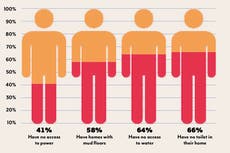Sacha Baron Cohen demands US Congress ask Mark Zuckerberg about refusing to ban Steve Bannon from Facebook
Bannon ‘advocated murder’ of White House’s leading infectious disease expert on social platform
Sacha Baron Cohen has reignited his feud with Facebook creator Mark Zuckerberg.
The social media platform recently came under fire after it found that posts, in which Steve Bannon called for Dr Anthony Fauci's head to be put on a spike outside the White House, had not violated enough of its rules to warrant a suspension.
Fauci, who is the White House's leading infectious disease expert, was named in former Trump strategist Bannon's post alongside FBI Director Chris Wray.
Instead, Facebook removed numerous pages connected to Bannon, but only because they were artificially inflating their reach and not due to the content.
Borat star Baron Cohen wrote on Twitter: "A good question for Mark Zuckerberg when he appears before Congress on Tuesday: Facebook says it does not allow a person who 'advocates...acts of violence'.
"Yet you’ve granted an exception to Steven Bannon, who advocates for the murder and beheading of Dr. Fauci. WHY?!"
Zukcerberg will be appear before US Congress alongside Twitter CEO Jack Dorsey on Tuesday (17 November).
They will be questioned on the subject of electoral “censorship” and “suppression” in the wake of their decision to limit the reach of an article smearing Joe Biden's reputation on their respective social media sites.
Since it was revealed that Bannon would not be banned from the platform, Baron Cohen has been sharing articles written by others who have been banned by Facebook for minimal reasons, including "making them look bad".
In 2019, the actor launched a scathing attack on social media giants, including Twitter and Facebook, calling them “the greatest propaganda machine in the world”.

Watch Apple TV+ free for 7 day
New subscribers only. £9.99/mo. after free trial. Plan auto-renews until cancelled.
ADVERTISEMENT. If you sign up to this service we will earn commission. This revenue helps to fund journalism across The Independent.

Watch Apple TV+ free for 7 day
New subscribers only. £9.99/mo. after free trial. Plan auto-renews until cancelled.
ADVERTISEMENT. If you sign up to this service we will earn commission. This revenue helps to fund journalism across The Independent.
“All this hate and violence is being facilitated by a handful of internet companies," he said.
“Think about it. Facebook, YouTube and Google, Twitter and others – they reach billions of people. The algorithms these platforms depend on deliberately amplify the type of content that keeps users engaged – stories that appeal to our baser instincts and that trigger outrage and fear.”
Join our commenting forum
Join thought-provoking conversations, follow other Independent readers and see their replies
Comments


Bookmark popover
Removed from bookmarks